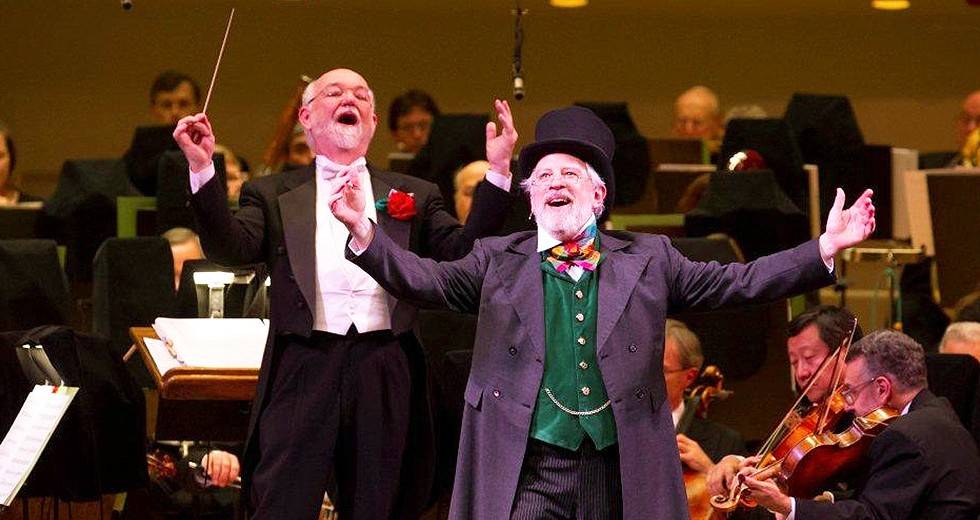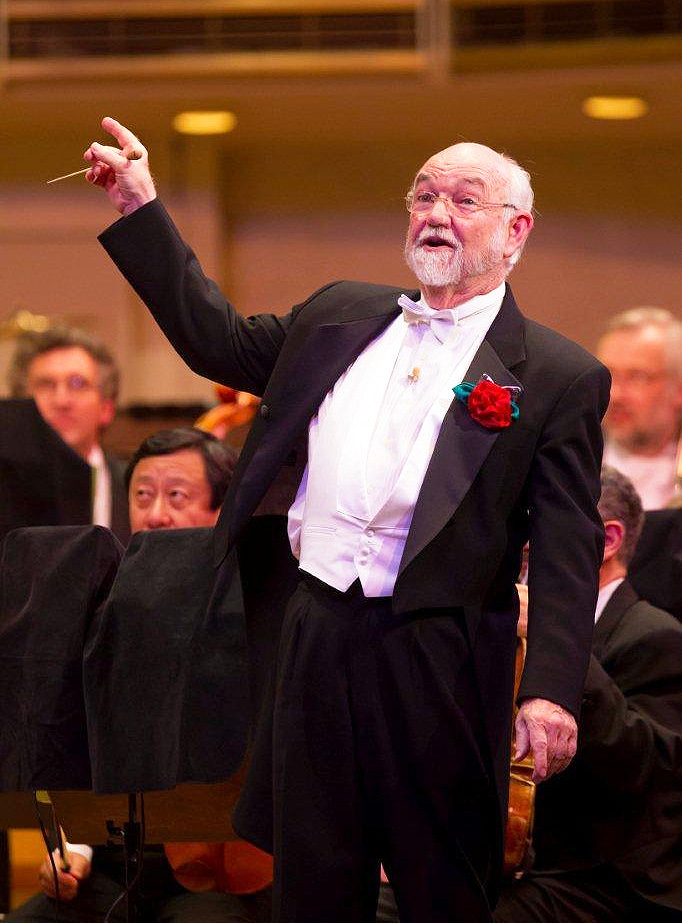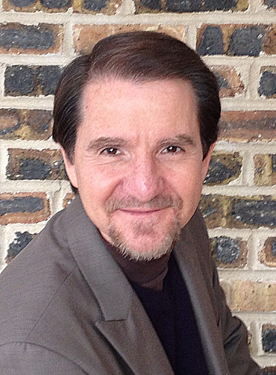
The Chicago Symphony Orchestra’s annual Welcome Yule! concerts, now in their 20th and final season, never have been typical Christmas fare. Yes, the Chicago Symphony Chorus sings traditional carols, and there are always audience sing-alongs as well the “Hallelujah” Chorus from Handel’s Messiah every few years.
But from the very first show in 1995, Duain Wolfe, CSO chorus director and the creative force behind Welcome Yule!, wanted to present something more than the usual Christmas-concert program. One year, Welcome Yule! audiences watched Santa fretting over a balky GPS that threatened to send his Christmas Eve rounds seriously off-course. Another year, they heard CSO musicians tootling away on homemade brass instruments, with enough odd-looking pipes and valves to stock a microbrewery. They listened to Leroy Anderson’s familiar “Sleigh Ride” spiced with touches of be-bop, jazz, and rhythm and blues. Every year there were some world premieres, and since 1996, the sound of “Christmas in Chicago,” a catchy sing-along tune created by Chicago-based composer Gary Fry.
The CSO’s Welcome Yule! begins its 20th annual engagement on Dec. 13, with performances through Dec. 23 at Symphony Center.
“It’s kind of a surprise for people who come to Welcome Yule!,” said Wolfe, “because they’re expecting ‘Silent Night’ and ‘Rudolph, the Red-Nosed Reindeer.’ We want the show to be fresh. Many organizations do exactly the same program every year. The Nutcracker is the same, Messiah is the same. Lots of symphonies that do these kinds of programs do the same program each year, or they might change one or two numbers. But I didn’t want to do that and Gary wasn’t into that, either. “So,” said Wolfe with a laugh, “we thought let’s do a totally different program each year so we get to work on it all year long!”
Welcome Yule! grew out of Christmas concerts Wolfe had created with the Colorado Symphony and Chorus before becoming Chicago Symphony Chorus director in 1994. CSO staff asked him to do something similar in Chicago. “The first concert in 1995 was an experiment,” Wolfe said. “But it was so well-received that it was clear it would go on for a couple more years.”
Critical as well as audience response was positive. In a 1998 review, the Chicago Tribune observed, “In its Christmas pops program called Welcome Yule!, the Chicago Symphony Orchestra again shoots for a difficult double goal, delighting the kids without lowering its own standards.”
Meanwhile, Wolfe wanted something to set the program apart. “After the first year, I said, ‘If we’re going to continue this, I would like for us to have our very own song.’ I wanted the CSO’s Christmas event to be something that was unique,” he said. “If we just did everybody else’s music all the time, we wouldn’t be unique. So if we have our own song that’s sung only in Orchestra Hall, it’s something you have to come to Orchestra Hall to hear.”
Wolfe began asking people about local composers, and Cheryl Frazes Hill, associate director of the Chicago Symphony Chorus, mentioned Fry. A Northfield resident, Fry is a composer-arranger whose credits include commercials for clients ranging from McDonald’s and Sears to the U.S. Air Force. He won an Emmy in 2006 for his music for WBBM-TV.
“I assumed there would be a string of composers I would be interviewing,” Wolfe said. “Gary was first, and I didn’t talk to anybody else after that. He was exactly the person I was looking for.”
And Wolfe knew exactly the kind of song he wanted Fry to write.
“Duain said, ‘I want a piece that sounds like it’s been around for 50 years and that the audience can sing the first time they hear it,’ ” Fry said. “My background was in the commercial music business, where part of your skill set is trying to come up with music that’s memorable in a very short amount of time. So that wasn’t so daunting for me.” And so “Christmas in Chicago” was born.
From the first season, the shows included dancers and a children’s chorus as well as the CSO and its chorus. The audience has opportunities to sing along. Tim Gregory, the show’s stage director, periodically shows up as Officer Mike, a Chicago cop adept at putting out incipient fires. For instance, when Santa’s GPS acted up, Officer Mike calmed agitated children who worried that Santa might be a no-show.
“It was about eight years ago or so that we added a stage director,” said Fry, “because we kept adding elements. Gradually, rather than just a set of numbers with an over-arching theme, there started to be an actual story line. We hired actors to play actual parts. As it went along, even the first half became part of this cohesive experience. Once we got all that in place, it was obvious that we needed somebody who could really pay attention to the staging.”
The Welcome Yule! programs do follow a bit of a formula. “People are coming to a Christmas concert,” Wolfe said. “They want to hear Christmas music.” The first half of the concert tends to be more serious, with beautiful, traditional Christmas classics. For the second half, Wolfe said, “We loosen up a bit and have lots of fun.”
The serious portion of this year’s Welcome Yule! was inspired by the centennial of the Christmas Truce of 1914: During World War I, German and British troops, yearning to be home for Christmas, set aside their guns on Christmas Eve and sang carols together across the battle lines. (The incident also was depicted in the Oscar-nominated French film “Joyeux Noël” (2005) and the opera Silent Night, which received the Pulitzer Prize for Music in 2012.) To close the program’s first half, Fry wrote a ballad titled “The Christmas Truce of 1914,” to be sung by the Chicago Symphony Chorus. It will be followed by Fry’s arrangement of the yuletide favorite “O Holy Night.”
Each Welcome Yule! production involves approximately 250 people, from orchestra players to costume stitchers. Planning begins more than a year in advance. “I keep notes all the time,” Wolfe said, “and get serious about developing the following year’s program about 14 months out. It’s when you’re in the final rush — November, December — that you start having ideas for a future program. For this year, I developed a program in November 2013 and then drafted a preliminary script in January. When Gary and Tim and I met that month, we discarded most of that first draft, but it became the driving force for many new drafts in the following months. The process is labor-intensive, while also being very enjoyable and rewarding.”
The amount of work required to stage Welcome Yule! is among the reasons that prompted Wolfe and his team to make this season its last. “From the beginning, we wanted to create a new holiday event that people would look forward to each year with something new, something familiar and something unexpected,” he said. “But when creating something new, I believe it is also important to bring it to an artful close. Our 20th annual production of Welcome Yule! seems a fitting time to end on a high note, and that is what we’ll do as we celebrate the holiday season with our CSO audiences this year. But the future also looks bright as we already have plans in store for new CSO holiday traditions to be announced as part of our 125th anniversary season in 2015/16.”
With every Welcome Yule! production there are several constants. “So many of the people who come to Welcome Yule! for the first time remark about two things primarily,” Fry said. “They know it’s going to be a great orchestra. They know it’s going to be a great chorus. But they’re surprised and so happy with the involvement of dancers and actors, because it gives even young children something visual to watch, and it just adds a tremendous amount to the concert.
“And the second thing,” he said, “is that they had no idea they were going to laugh and have so much fun. That takes everyone by surprise. They expect, ‘Oh, the Chicago Symphony — it’s going to be very serious.’ That’s not to say it isn’t at the highest possible musical level. But it’s really a chance for the orchestra to let their hair down and have fun. People really appreciate that.”
Wolfe recalled one year when CSO trumpeters, who were using heralds, the kind of long, slim instruments associated with angels, emerged from the orchestra and joined the dancers. “They started doing all these goofy steps,” said Wolfe. “People don’t expect to see the Chicago Symphony players do that.”
Welcome Yule! concerts require many months of development and rehearsal. “I work very hard,” Fry said. “I take very seriously that I’m writing for the best orchestra and chorus in the world. I want the music I put in front of those players to be of a caliber that challenges their musicianship and that they can enjoy performing.”
“It’s the Chicago Symphony Orchestra and Chorus,” Wolfe said. “They can make remarkable music at a virtuosic level. Gary’s given us some real challenges.” A piece Fry wrote in the style of the vocal group the Swingle Singers, for instance, is “incredibly difficult,” Wolfe said.
Every year, topical references pop up in “Christmas in Chicago” and other songs. Wolfe and Fry fondly remember a witty reference to something “more colorful than Dennis Rodman’s hair,” a nod to the flamboyant Chicago
Bulls player of the mid-1990s.
Most of all, they cherish the loyal audiences. “With 20 years, we have a second generation,” Wolfe said. “People who were children in the early years are now bringing their own children.”
Welcome Yule! has brought many generations together for two decades. Though this year marks its final season, its delightful spirit will always be a part of Christmas in Chicago.
Wynne Delacoma, classical music critic for the Chicago Sun-Times from 1991 to 2006, is an arts writer and lecturer.

